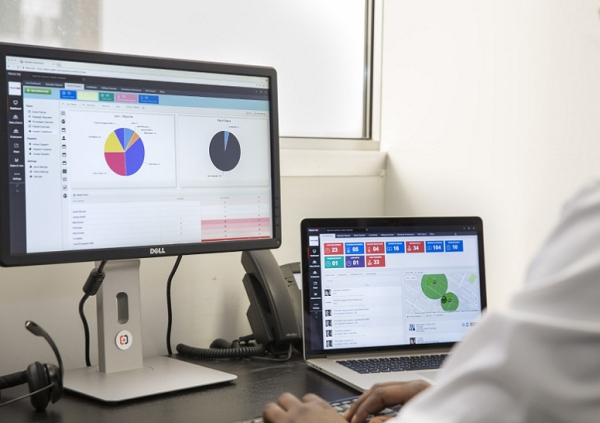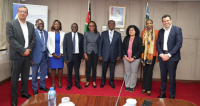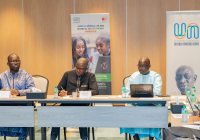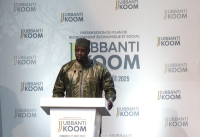• Mauritania launched a platform to digitalize mining permit oversight and boost transparency.
• Users can securely submit production, expense, and CSR data.
• The move modernizes a sector making up 23% of GDP amid weak e-governance.
Mauritania’s Ministry of Mines and Industry has launched a new digital platform to monitor and oversee mining and quarrying permits. The initiative is designed to increase transparency, ensure data reliability, and simplify administrative procedures for granting and supervising licenses.
The platform requires a secure login and allows permit holders to submit technical and production data, expense documents, and updates on their corporate social responsibility. Users can also file various administrative requests, such as sample submissions and approval applications.
The confidentiality of all data is protected under Article 59 of the mining law, which covers activity declarations, environmental, administrative, and financial monitoring, and the transfer of mandatory information. The ministry has instructed license holders to contact its regional offices or email Cette adresse e-mail est protégée contre les robots spammeurs. Vous devez activer le JavaScript pour la visualiser. to get their login credentials and a user guide.
This platform arrives as Mauritania's e-governance is still developing. The country ranks 174th out of 193 in the United Nations Global E-Government Development Index with a score of 0.3491. This low ranking highlights a significant gap in digital infrastructure, access to online public services, and the use of technology within the government.
The digitalization of mining oversight is a key step for a sector that contributes about 23% to Mauritania's national GDP. It could improve transparency among stakeholders and make the country more attractive to investors. By centralizing data and streamlining communication between the government and operators, the platform provides a strategic tool for a more rigorous and modern regulation of Mauritania’s extractive activities.
Samira Njoya
The entrepreneur is developing projects that combine savings, payments, and distribution to revolutionize common financial practices for people in Africa.
Oussoumanou Sehou, a Cameroon-based entrepreneur, specializes in fintech and Know Your Customer (KYC) analysis. He is the founder and CEO of Molo Molo Pay, a company launched in 2022 that offers installment payments for everyday consumer goods.
Molo Molo Pay's mobile application allows users to reserve products like phones, motorcycles, and household appliances. Users can pay for these items in installments, making essential goods more accessible for people with limited financial resources. This approach is part of a broader financial inclusion strategy.
The application also features a savings tool, which helps users manage their payments gradually. A user selects a product, makes regular payments, and tracks their progress on the interface. Once the full amount is paid, they can pick up the item from a partner store. This model targets African markets where traditional credit systems are often difficult to access.
Sehou is also the founder of Nanou, a fintech platform launched in June 2025. Nanou allows users to receive items on credit and pay in installments. Additionally, he works as a KYC officer at Mastercard and is an associate at BlackRock, a U.S.-based asset manager and technology provider.
Sehou earned an advanced management degree in 2017 from the Pan-African Institute for Development in West Africa, located in Cameroon. He also holds a master’s degree in banking, business, finance, and securities law from HEC Paris, which he obtained in 2020.
His professional career began in 2018 as a data quality analyst at HSBC, a London-based banking and financial services group. From 2020 to 2023, he was a credit agent at FairMoney, a Nigerian startup specializing in instant loans.
Melchior Koba
• BCEAO to launch instant payment system (PI-SPI) for WAEMU in September.
• Enables real-time transfers across banks, microfinance, and mobile money.
• Supports rising digital use; e-money accounts hit 209M in 2023.
The Central Bank of West African States (BCEAO) announced on Friday that its Interoperable Instant Payment System Platform (PI-SPI) is scheduled to launch at the end of September. The new regional infrastructure is designed to facilitate real-time money transfers within the WAEMU area.
The system will allow clients of banks, microfinance institutions, and electronic money operators to make instant, secure, and interoperable transfers regardless of the account type or channel used. Pilot tests have been underway with a sample of selected clients since June 5 to assess the system's performance under real conditions.
This unified payment system was established to meet the growing demand for faster, safer, and more accessible financial services in West Africa. According to a BCEAO report, the number of active electronic money accounts in the WAEMU area rose from 157 million to 209 million between 2022 and 2023, an increase of 32.74%. These services now contribute to 56% of the region’s overall financial inclusion rate, which was 72.3% at the end of 2023.
With PI-SPI, the central bank is advancing its payment system modernization plan and facilitating the interconnection of various financial players in the region. The goal is to build a more integrated ecosystem that can support the growth of fintechs, streamline electronic flows, and reduce the region's dependence on cash.
Ultimately, the system could encourage wider adoption of digital payment methods for daily use and expand access to financial services in areas underserved by traditional networks. By connecting financial sector players, this initiative paves the way for unprecedented regional interconnection.
Samira Njoya
• Flat6Labs becomes F6 Group, combining accelerator and new VC arm F6 Ventures.
• F6 Ventures manages $90M, aims for $200M and 200+ investments in 5 years.
• Responds to early-stage funding drop in MENA, down to $1.9B in 2024.
After more than a decade of supporting startups across the Middle East and Africa, Flat6Labs announced on Tuesday, August 5, that it is reorganizing into a new structure called F6 Group. The new entity will combine its flagship accelerator, Flat6Labs, with F6 Ventures, a new venture capital firm focused on seed-stage investments. This reorganization aims to provide more targeted support to early-stage ventures in emerging markets.
"F6 Ventures marks a new era in our journey, bringing focused capital and sharper execution to support the region’s boldest founders," said Dina el-Shenoufy, co-founder and General Partner at F6 Ventures. "We are extending our commitment to early-stage startups to help them scale from idea to impact."
According to a press release, F6 Ventures specializes in seed funding and currently manages over $90 million in assets with a portfolio of more than 300 startups. Flat6Labs will continue to operate as a leading acceleration platform. The F6 Group plans to launch several regional funds to grow its assets under management to $200 million and invest in more than 200 companies over the next five years.
This initiative comes as entrepreneurial ecosystems in Africa and the Arab world face a significant lack of early-stage funding. In the Middle East and North Africa, venture capital financing has slowed significantly over the past two years due to high interest rates. Fundraising in the region peaked at $3.6 billion in 2022 before dropping to $1.9 billion in 2024, reflecting the impact of global monetary policies on capital availability.
By combining capital and support under one umbrella, F6 Group aims to close this funding gap. The goal is to build a platform that can catalyze innovation through integrated support from pre-seed to regional expansion. This initiative could help emerging ecosystems by nurturing competitive tech companies, creating skilled jobs, and strengthening digital sovereignty in the regions.
Samira Njoya
As e-commerce booms in Africa, so do delivery services. In Egypt, one tech entrepreneur is tapping into this market by partnering with local businesses.
Founded in 2017 by El Sayed Kassem, Akelni is a Cairo-based startup that developed a digital solution to connect customers with local restaurants, cafes, and fast-food outlets. Its goal is to provide a fast, seamless meal ordering experience while helping partner restaurants with their digitalization.
Akelni's app, which has over 500,000 downloads on the Play Store, allows users to browse menus, place orders, customize meals, and track deliveries in real time. It offers a wide selection of dining options, from fast food to fine dining, including local brands. The service currently operates in several major Egyptian cities and plans to expand into other North African markets.
The company uses custom-developed technology with an intuitive customer interface, a dashboard for restaurant owners, and an integrated logistics solution for delivery staff. This model optimizes the restaurant value chain by reducing delivery times, improving order management, and facilitating digital payments.
With the demand for delivery services increasing, Akelni has positioned itself as a local competitor to international companies. The startup aims to strengthen its presence in the regional foodtech market by promoting a delivery model focused on proximity, efficiency, and digital inclusion.
Adoni Conrad Quenum
A serial entrepreneur, he develops digital tools that are shaking up the norms of traditional finance in East Africa. He leads several fintech companies.
Samuel Njuguna, a University of Nairobi computer science graduate, is a Kenyan entrepreneur specializing in fintech and financial innovation. As co-founder and CEO of Chumz, a company founded in 2019, he aims to transform saving and investing in East Africa.
Chumz offers an app that lets users save or invest with as little as five Kenyan shillings, or less than four cents, removing traditional barriers to banking services. The app uses features like creating personal or group savings goals, progress tracking, and detailed reports to make saving accessible and appealing. Its approach is based on behavioral psychology and gamification to target unbanked or low-income individuals. The app also allows users to form family, friend, or community savings groups to achieve financial goals together.
Njuguna also serves as CEO of Tunzi, a fintech platform launched in March 2025. Tunzi allows users to save money when sending or receiving funds and during daily purchases. Additionally, Njuguna is a co-founder of Wezago, a startup launched in 2021 that provides access to smart devices through ethical loans to improve living conditions across Africa.
Melchior Koba
The partnership talks to Kenya’s biggest digital ambitions — secure infrastructure, AI-powered governance, globally competitive talent, and sovereign data control. By collaborating with a global tech heavyweight like Microsoft, Kenya can de-risk its digital transformation journey while unlocking new economic opportunities for its citizens.
On July 31, a high-level meeting was convened between senior government officials and a Microsoft delegation to explore strategic areas of collaboration aimed at accelerating Kenya’s digital transformation. The discussions focused on enhancing cybersecurity, fortifying the security of public infrastructure and citizen data, and rolling out Digital Hubs across the country to foster innovation and connectivity.
In attendance from the government were Principal Secretaries Stephen Isaboke (Broadcasting & Telecommunications) and Eng. John Tanui (ICT & Digital Economy), along with Emmanuel Kata, Secretary of ICT and Security Audit Control. Representing Microsoft were Rashida Hodge, Corporate Vice President of Data and AI Customer Success; Aarti Borkar, Corporate Vice President of Security, Customer Success & Incident Response; and Phyllis Migwi, Country Manager, Microsoft Kenya, among other senior executives.
A key highlight of the meeting was the integration of Artificial Intelligence (AI) across government operations. Both parties emphasized the importance of mainstreaming AI to improve service delivery, strengthen policymaking, and build institutional resilience. This initiative is expected to position Kenya as a leader in AI adoption within the public sector.
The dialogue also delved into strengthening Data Governance and Compliance frameworks. The government and Microsoft explored ways to promote trusted cloud partnerships while ensuring sovereign control over national data assets. This approach aims to reinforce public trust and safeguard sensitive information in an increasingly digital world.
The high-level engagements with Microsoft come at a pivotal moment in Kenya’s digital journey. According to the latest GSMA report, Driving Digital Transformation of the Economy in Kenya, the digital economy is projected to contribute KSh 662 billion to GDP by 2028, up from KSh 421 billion in 2022. Realising this potential requires rapid expansion of secure digital infrastructure, cloud services, AI-enabled public service delivery, and trusted data governance — all areas central to the discussions. By partnering with global technology leaders, Kenya aims to not only safeguard its digital transition but also unlock new economic value, accelerate job creation, and cement its position as a regional hub for innovation.
Hikmatu Bilali
South African tech entrepreneur Sibongile Maputla is disrupting how children receive gifts with an innovative investment concept.
Squirrel Away is a fintech solution created by a South African startup of the same name. Launched in May 2025 by Sibongile Maputla, the app lets users give long-term financial gifts in the form of investments rather than short-lived material goods.
Available on iOS and Android, the app has been downloaded over a hundred times, according to Play Store figures. It targets families who want to build capital for their children's futures, such as for education or a first home. Each child has a personalized profile where family members can contribute by investing small amounts into portfolios chosen for their financial goals.
Squirrel Away aims to make investing accessible from an early age in a country where financial literacy is uneven. By focusing on young households and extended families, the app promotes intergenerational planning and financial education.
"Squirrel Away allows families and friends to turn every celebration into a meaningful step towards building generational wealth," said Sibongile Maputla. "Whether it’s a child’s birthday, a graduation, or simply a thoughtful gesture, every contribution to the app grows alongside the child, offering both immediate joy and long-term impact."
She added, "Traditional investment platforms often intimidate people with jargon, high barriers to entry, or complex processes. I wanted to create a solution that simplifies financial planning and integrates it into a culturally relevant, everyday act—gifting."
In an uncertain economic environment with significant inequality, the solution stands out for its inclusive and educational approach. It also allows children to track their portfolio's growth, helping them understand the basics of saving and investing. Over the long term, Squirrel Away plans to expand to other African markets, hoping to transform how families think about gifts by favoring lasting impact over instant gratification.
Adoni Conrad Quenum
• Senegal reviewed progress of the Force-N digital jobs program ahead of its 2026 end.
• Backed by Mastercard Foundation, it targets 70,000 jobs and 1,000 startups.
• To date: 2,548 trained, 13,554 linked to jobs, 7 startups created.
Senegal’s Minister of Higher Education, Research and Innovation, Dr. Abdourahmane Diouf, chaired the first Steering Committee meeting for the Force-N program on Tuesday, July 29, in Diamniadio. The program was developed by the Cheikh Hamidou Kane Digital University (UNCHK) in partnership with the Mastercard Foundation.
The committee, which includes key institutional stakeholders from the presidency, prime minister's office, and various ministries and partners, reviewed the program's progress. It also defined its strategic direction and worked to strengthen its governance and nationwide deployment.
Launched in 2022 as a five-year initiative, Force-N aims to create 70,000 jobs for young people, support 10,000 entrepreneurs, and launch 1,000 startups in the digital sector. The program focuses on five key pillars: training, professional integration, entrepreneurship, digitalization of public administration, and the promotion of artificial intelligence.
Although it predates the Technological New Deal, Force-N aligns with its goals and those of the 2050 Agenda. Both initiatives seek to establish Senegal as a digital hub by promoting STEM skills, youth employment, and innovative entrepreneurship.
With one year remaining before its scheduled conclusion in 2026, the program has shown modest results. It has trained 2,548 young people in entrepreneurship, connected 13,554 to job opportunities, and created seven startups. This first steering committee meeting is expected to intensify action, strengthen partnerships, accelerate the program's rollout across the country, and adopt more agile mechanisms to meet its ambitious targets.
These measures are intended to maximize Force-N’s impact and reinforce Senegal’s digital transformation efforts.
Samira Njoya
• Senegal launches "Jubbanti-Koom" to restore fiscal stability by taxing digital sectors like online betting, mobile money, and digital content.
• Key reforms include taxing gross gaming revenue and player winnings, expected to generate CFA 400 billion annually.
• Plan also focuses on digitizing procurement, expanding digital ID, and formalizing the informal digital economy.
In a challenging macroeconomic context, Senegal’s Prime Minister Ousmane Sonko unveiled the country’s Economic and Social Recovery Plan, a cornerstone of its Vision 2050 agenda. Named Jubbanti-Koom, the plan aims to restore fiscal sustainability while funding more inclusive development. To achieve this, the government is betting on digital technology as a strategic lever for both growth and increased public revenue.
The plan is built around several fiscal measures targeting high-growth digital segments, including online gaming, mobile money, digital advertising, video on demand, and income from influencers. The government intends to tap into these often under-regulated niches to create new fiscal space.
Regulating and Taxing Online Betting
One of the plan’s key measures is a tax on the gross gaming revenue of online sports betting and games of chance, which are primarily operated by foreign companies. The government also plans to tax player winnings. This reform is expected to generate approximately 400 billion CFA francs in annual tax revenue. It also aims to protect Senegalese consumers, especially young people, from the risks of a poorly regulated environment.
The reform includes a stronger push to digitize public procurement. This is expected to streamline public spending and improve the traceability of financial flows. Online advertising, video on demand services, and income from digital content will now be incorporated into the tax base. Another strategic focus is optimizing taxation on mobile money, which has become a key money transfer channel for millions of Senegalese.
Structural Transformation of the Digital Tax Framework
Beyond immediate measures, the plan includes a technical component to prepare the economy for the rise of new digital services. This involves accelerating digital identification, which is crucial for the reforms’ success, and deploying reliable technology infrastructure, as outlined in the Technological New Deal.
In a country where digital activities account for a significant portion of the informal economy, these measures are expected to reduce tax evasion, provide better oversight of digital actors, and create a more formal and productive ecosystem. Ultimately, Senegal hopes to turn the digital sector into a genuine engine of growth and fiscal equity.
Samira Njoya
More...
With a background in law, Katia Kuseke has shifted her focus to nurturing the growth of Africa’s agricultural sector through cutting-edge technology. Her vision enables farmers on the continent to penetrate larger, international markets with greater ease.
Kuseke, a Franco-Congolese entrepreneur born in Kinshasa and now based near Paris, is the co-founder and Managing Director of Fresh Afrika, a promising food technology startup. Since its inception in 2021 with fellow entrepreneur Noëlla Ligan from Cameroon, Fresh Afrika has been building a platform that links smallholder farms in sub-Saharan Africa directly to European consumers. By facilitating the delivery of fruit, vegetable, and spice baskets, the startup ensures greater transparency and simplifies the distribution process, strengthening the vital supply chain between Africa and Europe.
The company’s strategy hinges on short supply chains, eliminating middlemen and employing cutting-edge technology like blockchain to trace products from farm to table. Each basket contains seasonal, pesticide-free produce delivered fresh, catering mostly to chefs and restaurateurs in France who seek quality and transparency. Central to Fresh Afrika’s ethos is fair pricing that values local farmers’ labor and ensures they earn decent livelihoods.
Fresh Afrika also extends its commitment beyond commerce by partnering on community initiatives, particularly in education and infrastructure. It supports the establishment of daycare centers and schools close to production zones, directly enriching the lives of farming families.
Katia Kuseke, trained in law with degrees from University Paris Nanterre and Paris-Sorbonne, has positioned Fresh Afrika within several esteemed startup programs. Notable among them are the French Tech Tremplin, Station F’s Female Founders Fellowship, and the Google-backed Black Founders Fund, which included Fresh Afrika in its 2022 cohort.
This article was initially published in French by Melchior Koba
Edited in English by Ange Jason Quenum
Jigawa State Governor, Umar Namadi, has received a delegation from the National Information Technology Development Agency (NITDA), The Peace Institute (TPI), and other collaborating organizations at the Government House in Dutse, as the state hosts a groundbreaking Digital Literacy Training Camp in Hadejia.
The three-week program, announced July 29, aims to train 1,050 primary school pupils and enhance the digital capacity of 30 teachers. The initiative is designed to equip the next generation with essential skills to thrive in the digital era and meet the demands of a rapidly evolving knowledge economy.
The training program in Hadejia signals a crucial step in expanding digital inclusion in underserved areas and creating pathways for young learners to become digitally fluent, globally competitive citizens.
The Tshwane University of Technology (TUT) renewed a partnership agreement with Huawei on 17 July 2025. The collaboration, anchored within TUT’s Faculty of Information and Communication Technology (ICT), signals a shared commitment to fostering innovation, expanding access, and enhancing South Africa’s digital capabilities.
A key highlight of the agreement was Huawei’s awarding of R2 million in bursaries to high-performing ICT students. The latest agreement builds on nearly a decade of collaboration between the two institutions.
Since the establishment of the TUT-Huawei ICT Academy in 2016, over 1,000 students have received training and certification in advanced technologies such as 5G, cloud computing, cybersecurity, and the Internet of Things (IoT).
-
Many African countries still lack standardized digital address systems.
-
This gap limits access to essential services, especially in rural areas.
-
Governments are launching reforms to support digital inclusion and growth.
Across Africa, the absence of reliable digital address systems remains a major barrier to accessing essential services and advancing economic development. As digital economies grow rapidly, several countries are stepping up efforts to map their territories and build more connected and inclusive governance systems.
In many regions, assigning precise and standardized digital addresses to homes, businesses, and infrastructure is still a structural challenge. Without these systems, citizens face hurdles in everyday services such as package delivery, healthcare, emergency response, and administrative processes.
Large parts of rural Africa, as well as informal urban areas, remain without formal addresses. This weakens logistical networks, disrupts territorial planning, and limits delivery of basic services. For millions, not having an address means being left out of economic systems and public support.
Governments launch national reforms to modernize address systems
Several African countries have begun tackling the issue. Nigeria, for instance, launched a national program to overhaul its address system using GPS technology, mobile apps, and centralized digital databases. The project aims to improve location identification, public service delivery, and support the digital economy’s expansion.
Other countries such as Kenya, South Africa, Rwanda, and Senegal are moving in a similar direction, often through public-private partnerships focused on digitizing physical territory. In Cameroon and Guinea, governments are working with the startup FindMe to pilot digital addressing solutions, particularly to upgrade postal services and improve territorial connectivity.
This growing mobilization follows a broader international push. In 2009, the Universal Postal Union (UPU) issued a resolution urging all member states to implement national addressing systems. This prompted many African governments to see digital addresses as essential infrastructure for public policy, urban development, and digital transition.
A tool to unlock e-commerce, fintech, and modern services
Digital address systems could be a turning point for African economies. They provide a precise geographic framework that supports the rise of services in e-commerce, financial technology, transport, and healthcare.
In online retail, for example, address reliability is key to customer satisfaction. Africa’s e-commerce market is growing fast, with projected revenues surpassing $45 billion by 2028, according to Lithuanian fintech firm Nikulipe. But poor address systems make delivery more complex, expensive, and less dependable, limiting this growth.
A driver of better governance and broader inclusion
Beyond economic benefits, digital addresses also improve public governance. Local governments can plan infrastructure more effectively, manage services like waste collection or emergency response, and respond faster during health or environmental crises.
Address systems also improve access to financial and social services. Having a formal address can make it easier to open a bank account, register a business, or receive public assistance, key steps toward broader social and economic inclusion.
By upgrading their address systems, African countries are laying the foundation for lasting digital transformation. More than just a mapping tool, digital addressing is becoming a strategic asset for organizing territory, streamlining services, and building an inclusive digital economy.
In short, digital address infrastructure is not just a technical fix, it is a vital step toward better governance, deeper integration, and a more forward-looking Africa.
Samira Njoya















